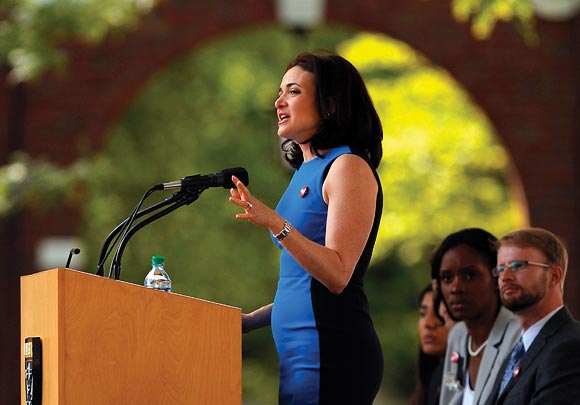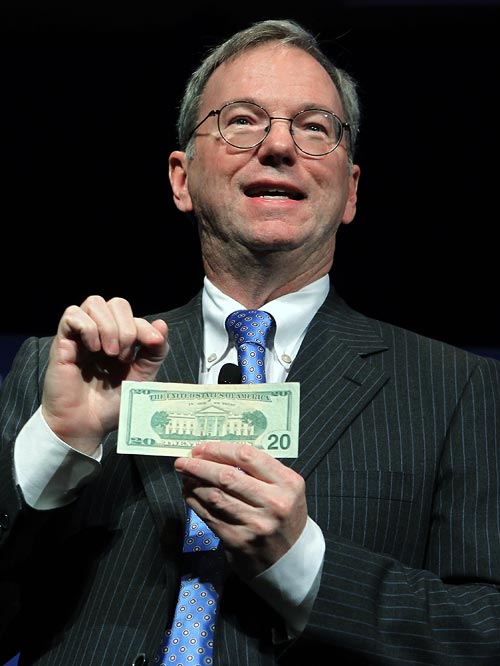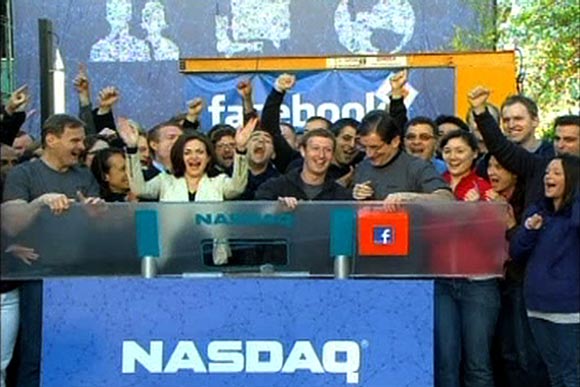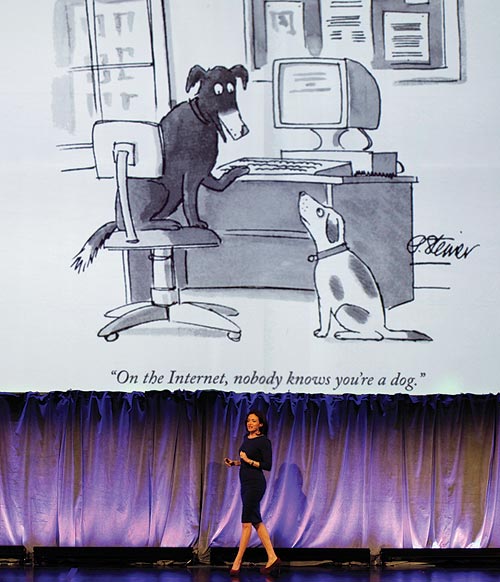Photographs: Brian Snyder/Reuters
'You're going to need talent, skill, and imagination and vision, but more than anything else, you're going to need the ability to communicate authentically, to speak so that you inspire the people around you and to listen, so that you continue to learn each and every day on the job.'
Facebook Chief Operating Officer Sheryl Sandberg, one of Silicon Valley's inspiring figures, delivered this inspiring speech at her alma mater, the Harvard Business School, last week.
It's an honour to be here today to address HBS's distinguished faculty, proud parents, patient guests and most important the class of 2012.
Today was supposed to be a day of unbridled celebration, and I know that's no longer true. I join all of you in grieving for your classmate...today still marks a distinct and impressive achievement for this class, so please join me in giving our warmest congratulations to the class...
When Dean (Nitin) Nohria asked me to speak here today, I thought, come talk to a group of people way younger and cooler than I am? I can do that, I do that every day, I like being surrounded by young people except when they say to me, 'What was it like being in college without the Internet?' or worse, 'Sheryl, can you come here, we need to see what old people think of this feature?'
When I was a student here 17 years ago, I studied social marketing with Professor Kash Rangan, and one of the many examples Kash used to explain the concept of social marketing was the lack of organ donors in this country, which kills 18 people every single day. Earlier this month, Facebook launched a tool to support organ donations, something that stems directly from Kash's work. Kash, we are all grateful for your dedication.
So, it wasn't really that long ago when I was sitting where you are, but the world has changed an awful lot. My section, Section B, tried to have HBS's first online class. We had to use an AOL chat room and dial-up service (your parents can explain). We had to pass out a list of screen names, because it was unthinkable to put your real name on the Internet. And it never worked. It kept crashing...the world wasn't set up for 90 people to communicate at once online.
But for a few brief moments though, we glimpsed the future, a future where technology would power who we are and connect us to our real colleagues, our real family, our real friends.
It used to be that in order to reach more people than you could talk to in a day, you had to be rich and famous and powerful, be a celebrity, a politician, a CEO, but that's not true today. Now ordinary people have voice, not just those of us lucky to go to HBS, but anyone with access to Facebook, Twitter, a mobile phone.
This is disrupting traditional power structures and leveling traditional hierarchy. Voice and power are shifting from institutions to individuals, from the historically powerful to the historically powerless, and all of this is happening so much faster than I could have imagined when I was sitting where you are today and Mark Zuckerberg was 11 years old.
As the world becomes more connected and less hierarchical, traditional career paths are shifting as well. In 2001, after working in the government, I moved out to Silicon Valley to try finding a job. My timing wasn't really that good.
The bubble had crashed, small companies were closing, big companies were laying people off. One woman CEO looked at me and said, 'We wouldn't even think about hiring someone like you.'
After awhile I had a few offers and I had to make a decision, so what did I do? I am MBA trained, so I made a spreadsheet. I listed my jobs in the columns and my criteria in the rows, and compared the companies and the missions and the roles. One of the jobs on that sheet was to become Google's first business unit general manager, which sounds good now, but at the time no one thought consumer Internet companies could ever make money.
I was not sure there was actually a job there at all. Google had no business units, so what was there to generally manage? And the job was several levels lower than jobs I was being offered at other companies.
Please click Next to continue reading Sheryl Sandberg's inspiring speech...
'If you're offered a seat on a rocket ship, don't ask what seat'
Image: Eric Schmidt told Sheryl Sandberg: Get on a rocket ship. 'When companies are growing quickly and they are having a lot of impact, careers take care of themselves,' she saysPhotographs: Alex Wong/Getty Images
So I sat down with Eric Schmidt, who had just become the CEO, and I showed him the spread sheet and I said, this job meets none of my criteria.
He put his hand on my spreadsheet and he looked at me and said, 'Don't be an idiot.' Excellent career advice. And then he said, get on a rocket ship.
When companies are growing quickly and they are having a lot of impact, careers take care of themselves. And when companies aren't growing quickly or their missions don't matter as much, that's when stagnation and politics come in.
If you're offered a seat on a rocket ship, don't ask what seat. Just get on.
About six and one-half years later, when I was leaving Google, I took that advice to heart. I was offered CEO jobs at a bunch of companies, but I went to Facebook as COO.
At the time people said, why are you going to work for a 23-year-old?
The traditional metaphor for careers is a ladder, but I no longer think that metaphor holds. It doesn't make sense in a less hierarchical world.
When I was first at Facebook, a woman named Lori Goler, a 1997 graduate of HBS, was working in marketing at eBay and I knew her kind of socially. And she called me and said, 'I want to talk with you about coming to work with you at Facebook. So I thought about calling you, she said, and telling you all the things I'm good at and all the things I like to do. But I figured that everyone is doing that. So instead I want to know what's your biggest problem and how can I solve it.'
My jaw hit the floor. I'd hired thousands of people up to that point in my career, but no one had ever said anything like that. I had never said anything like that.
Job searches are always about the job searcher, but not in Lori's case. I said, you're hired. My biggest problem is recruiting and you can solve it. So Lori changed fields into something she never thought she'd do, went down a level to start in a new field and has since been promoted and runs all of the people operations at Facebook and has done an extraordinary job.
Lori has a great metaphor for careers. She says they're not a ladder; they're a jungle gym.
As you start your post-HBS career, look for opportunities, look for growth, look for impact, look for mission.
Move sideways, move down, move on, move off.
Build your skills, not your resume.
Evaluate what you can do, not the title they're going to give you.
Do real work.
Take a sales quota, a line role, an ops job, don't plan too much, and don't expect a direct climb.
If I had mapped out my career when I was sitting where you are, I would have missed my career.
You are entering a different business world than I entered. Mine was just starting to get connected. Yours is hyper-connected. Mine was competitive. Yours is way more competitive. Mine moved quickly, yours moves even more quickly.
As traditional structures are breaking down, leadership has to evolve as well. From hierarchy to shared responsibility, from command and control to listening and guiding. You've been trained by this great institution not just to be part of these trends, but to lead.
As you lead in this new world, you will not be able to rely on who you are or the degree you hold.
You'll have to rely on what you know. Your strength will not come from your place on some org chart, your strength will come from building trust and earning respect.
You're going to need talent, skill, and imagination and vision, but more than anything else, you're going to need the ability to communicate authentically, to speak so that you inspire the people around you and to listen, so that you continue to learn each and every day on the job.
If you watch young children, you'll immediately notice how honest they are.
My friend Betsy in my section a few years after business school was pregnant with her second child and her first child was about five and said, 'Mommy, where is the baby?' And she said, 'The baby is in my tummy.' And he said, 'Aren't the baby's arms in your arms?' And she said, 'No, the baby's in my tummy.' 'Are the baby's legs in your legs?' 'No, the whole baby is in my tummy.' And he said, 'Mommy, then what is growing in your butt?'
As adults, we are never this honest, and that's not a bad thing. I have borne two children, the last thing I needed were those comments. But it's not always a good thing either. Because all of us, and especially leaders, need to speak and hear the truth.
The workplace is an especially difficult place for anyone to tell the truth, because no matter how flat we want our organisations to be, all organisations have some form of hierarchy. What that means is that one person's performance is assessed by someone else's perception.
This is not a set-up for honesty. Think about how people speak in a typical workforce. Rather than say 'I disagree with our expansion strategy' or better yet, 'this seems truly stupid', they say: 'I think there are many good reasons why we're entering this new line of business, and I'm certain the management team has done a thorough ROI analysis, but I'm not sure we fully considered the downstream effects of taking this step forward at this time.'
As we would say at Facebook on the Internet, three letters: WTF.
Please click Next to continue reading Sheryl Sandberg's inspiring speech...
'Motivation comes from working on things we care about'
Image: Sheryl Sandberg, third from left, with Facebook founder Mark Zuckerberg ring the NASDAQ stockmarket Opening Bell remotely from Facebook headquarters in Menlo Park, California, May 18Photographs: Jim Tanner/Reuters
Truth is better used by using simple language. Last year Mark decided to learn Chinese and as part of studying, he would spend an hour or so each week with some of our employees who were native Chinese speakers.
One day, one of them was trying to tell him something about her manager, so she said this long sentence and he said simpler please. And then she said it again and he said, no, I still don't understand, simpler please...and so on and so on.
Finally, in sheer exasperation, she burst out, 'My manager is bad.'
Simple and clear and very important for him to know. People rarely speak this clearly in the workforce or in life and as you get more senior, not only will people speak less clearly to you, but they will overreact to the small things you say.
When I joined Facebook, one of the things I had to do was build the business side of the company, put some systems into place, but I wanted to do it without destroying the culture that made Facebook great.
So one of the things I tried to do was encourage people not to do formal PowerPoint presentations for meetings with me, and I would say things like, 'Don't do PowerPoint presentations for meetings with me. Why don't you come in with a list of what you want to discuss?' But everyone ignored me, they kept doing their presentations meeting after meeting, month after month.
So about two years in, I said, 'Okay, I hate rules but I have a rule, no more PowerPoint in my meetings and I mean it.'
About a month later I was about to speak to our global sales team on a big stage and someone came up to me and said, 'Before you get on that stage, you really should know everyone's pretty upset about the no PowerPoint with clients thing...'
What? So I got on the stage and said, one, I meant no PowerPoint with me. But two, more importantly, next time you hear something that's really stupid, don't adhere to it, fight it or ignore it, even if it's coming from me or Mark.
A good leader recognises that most people won't feel comfortable challenging authority, so it falls upon authority to encourage them to question. It's easy to say that you're going to encourage feedback but it's hard to do, because unfortunately it doesn't always come in a format we want to hear.
When I first started at Google, I had a team of four people and it was really important to me that I interview everyone, being part of my team meant I had to know you.
When the team had gotten to 100 people, I realised it was taking longer to schedule my interviews so one day at my meeting of just my direct reports, I said maybe I should stop interviewing, fully expecting them to jump in and say no, your interviews are a critical part of the process. They applauded. Then they fell over themselves explaining that I was the bottleneck of all time.
I was embarrassed, then I was angry and I spent a few hours just quietly fuming. Why didn't they tell me I was a bottleneck, why did they let me go on slowing them down?
Then I realised that if they hadn't told me, that was my fault. I hadn't been open enough to tell them I wanted that feedback and I would have to change that going forward.
When you're the leader, it is really hard to get good and honest feedback, no many how many times you ask for it.
One trick I've discovered is that I try to speak really openly about the things I'm bad at, because that gives people permission to agree with me, which is a lot easier than pointing it out in the first place.
To take one of many possible examples, when things are unresolved I can get a tad anxious.
Really, when anything's unresolved, I get a lot anxious. I'm quite certain no one has accused me of being too calm. So I speak about it openly and that gives people permission to tell me when it's happening. But if I never said anything, would anyone who works at Facebook walk up to me and say, 'Hey Sheryl, calm down. You're driving us all nuts'? I don't think so.
As you graduate today, ask yourself, how will you lead. Will you use simple and clear language? Will you seek out honesty? When you get honesty back, will you react with anger or with gratitude?
As we strive to be more authentic in our communication, we should also strive to be more authentic in a broader sense. I talk a lot about bringing your whole self to work -- something I believe in deeply.
Motivation comes from working on things we care about, but it also comes from working with people we care about, and in order to care about someone, you have to know them. You have to know what they love and hate, what they feel, not just what they think.
If you want to win hearts and minds, you have to lead with your heart as well as your mind. I don't believe we have a professional self from Mondays through Fridays and a real self for the rest of the time. That kind of division probably never worked, but in today's world, with a real voice, an authentic voice, it makes even less sense.
I've cried at work. I've told people I've cried at work. And it's been reported in the press that Sheryl Sandberg cried on Mark Zuckerberg's shoulder, which is not exactly what happened.
I talk about my hopes and fears and ask people about theirs. I try to be myself. Honest about my strengths and weaknesses and I encourage others to do the same.
It is all professional and it is all personal, all at the very same time.
Please click Next to continue reading Sheryl Sandberg's inspiring speech...
'Make the effort to speak as well as seek the truth'
Image: Sheryl Sandberg delivers a speech beneath a New Yorker magazine cartoonPhotographs: Mike Segar/Reuters
I recently started speaking up about the challenges women face in the workforce, something I only had the courage to do in the last few years.
Before this, I did my career like everyone else does it. I never told anyone I was a girl. Don't tell.
I left the lights on when I went home to do something for my kids. I locked my office door and pumped milk for my babies while I was on a conference call.
People would say, what's that sound? I would say, 'What sound? I hear a beep. It's a fire truck.'
But the progress we've made in the last decade has convinced me we need to start talking about this.
I graduated from HBS in 1995 and I thought it was completely clear that by the time someone from my year was invited to speak at this podium, we would have achieved equality in the workforce. But women at the top C-level jobs are stuck at 15 per cent or 16 per cent and has not moved in a decade. Not even close to 50 per cent.
We need to acknowledge openly that gender remains an issue at the highest levels of leadership. The promise of equality is not equality. We need to start talking about this.
We need to start talking about how women underestimate their abilities compared to men and for women, but not men. Success and likeability are negatively correlated. That means that as a woman is more successful in your workplaces, she will be less liked.
This means that women need a different form of management and mentorship, a different form of sponsorship and encouragement, and some protection, in some ways more than men.
There aren't enough senior women out there to do it, so it falls upon the men who are graduating today just as much or more as the women, not just to talk about gender but to help these women succeed.
When they hear a woman is really great at her job but not liked, take a deep breath and ask why. We need to start talking openly about the flexibility all of us need to have both a job and a life.
A couple of weeks ago in an interview I said that I leave the office at 5 pm to have dinner with my children, and I was shocked at the press coverage. One of my friends said I couldn't get more headlines if I had murdered someone with an ax!
This showed me this is an unresolved issue for all of us, men and women. Otherwise, why did everyone write so much about it? And maybe, most importantly, we need to start talking about how fewer women than men, even from places like HBS, even in this class, aspire to the very top jobs.
We will not close the leadership gap until we close the professional ambition gap. We need more women not just to sit at the table, but as President Obama said a few weeks ago at Barnard, to take their rightful seats at the head of the table.
One of the reasons I was so excited to be here today is that Dean Nohria told me that this is the 50th anniversary of letting women into this school...Your dean is so passionate about getting more women into leadership positions and he told me he wanted me to speak this year for that reason.
I met a woman from that first class once. She told me that when they first came in, they took a men's room and converted it to a woman's room. But they left the urinals in. The urinals are long gone. Let's make sure that no one ever misses them.
As you and your classmates spread out across the globe and walk across this stage tomorrow, I wish for you four things:
First, keep in touch via Facebook; this is critical to your future success! And since we're public now, could you click on an ad or two?
Two, that you make the effort to speak as well as seek the truth.
Three, that you remain true to and open about your authentic self.
And four, most deeply, that your generation accomplish what mine has failed to do.
Give us a world where half our homes are run by men and half our institutions are run by women. I'm pretty sure that would be a better world.





Comment
article